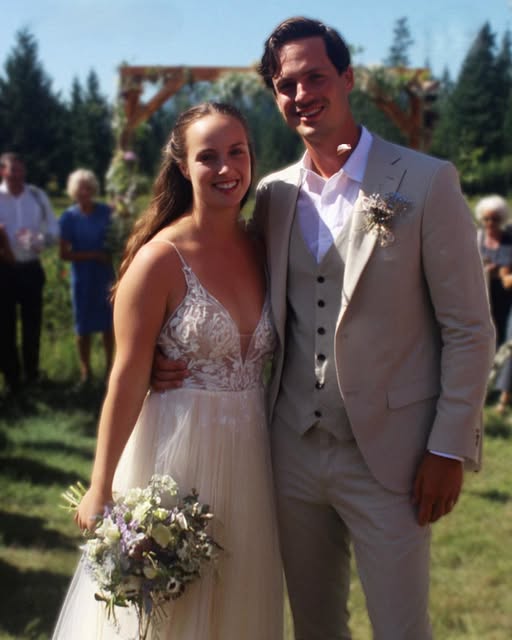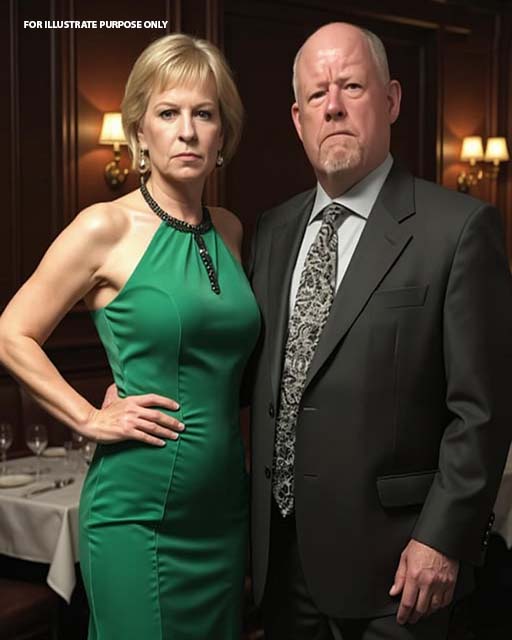The night my sister announced her wedding plans, she did it like a royal decree. “We’ll have it at the family property, obviously,” she said, waving a champagne flute as if my business were a backdrop she’d ordered from a catalog.
I grew up knowing I was optional. At fourteen, my mother slid a mug of coffee across the table and told me I was going to “help” my grandparents in the mountains. Like I’d been assigned a summer chore. “A while,” she said. A while turned into always. Emily, my older sister, stayed—the birthdays, the family dinners, the attention. I got packed into a car and sent up the switchbacks like unwanted luggage.
What my mother meant as exile became rescue. My grandparents’ place was acres of wild meadow and crisp sky, a stone-and-timber house with a porch that wrapped around like an embrace. There were roses to plant, fences to mend, three horses who listened better than most people. My grandparents were quiet, steady, generous. They taught me to fix what was broken and to never let anyone convince me I was small.
When they died four years ago, the will cracked the family like ice. My mother, Emily, and our brother split the cash and investments—more than a million dollars. The mountain property they left to me. “To our granddaughter Claire, who will appreciate it and take care of it,” the lawyer read. My mother flushed red; Emily laughed out loud. “What’s she going to do with a house?” I was twenty-one.
I turned it into a wedding venue. I worked dawn to midnight, took a small business loan, painted fences between tours, learned to wrangle florists, DJs, and panicked aunts. Year one: six bookings and a lot of praying. Year two: real momentum. By year three, we were booked eight months out. At twenty-five, I was running a thriving business that made my grandparents’ land sing again.
Emily got engaged to a finance guy named Brandon. Perfect teeth, firm handshake, not unkind. She showed off the ring and declared, “Of course we’ll get married at the family property. Tradition.” I smiled, professional. “Great. Send me your date so I can block it in the system.”
For eighteen months, I tried. Texts, calls, a conversation over Christmas ham while my mother pretended not to hear: “Emily, I really need your date. We book up far in advance.” “You’ll know when you need to know,” she snapped. “Stop being so uptight. It’s family.”
Two weeks ago, her invitation arrived—thick cream paper, looping calligraphy. September 14. I opened my booking calendar anyway, though I already knew. The Morrison wedding had reserved that date a year earlier. Deposit paid. Contract signed.
I called Emily. “You never gave me your date,” I said. “I already have clients on September 14.”
Silence, then a scream so loud I had to hold the phone away. “ARE YOU KIDDING ME? IT’S FAMILY PROPERTY. YOU’RE GOING TO RUIN MY DAY?”
“I asked you for your date dozens of times,” I said. “I can’t cancel paying clients who followed the rules.”
“Cancel them,” she hissed. “This is why Mom sent you away. You’ve always been selfish. Family comes first.”
“It’s not ‘family property’ anymore,” I said evenly. “It’s my business. I offered to help you pick another date.”
She hung up. My phone lit up like a bonfire: my mother, an aunt, a cousin, even Brandon’s mother, all calling to inform me what kind of monster I was. Then strangers started leaving one-star reviews about how “the owner mistreats her own family.” None of them had ever set foot on the property.
I sent one last text: “From now on, please use my business line and email so there’s a record. Here are three alternative dates in Sept/Oct. Please confirm by Friday.”
She didn’t respond. The harassment didn’t stop.
The day before the Morrison wedding, tires screeched up the gravel drive. Emily’s SUV. She stepped out in a white dress that wasn’t a bridal gown but wanted to be, hair shellacked, face carved into fury. She marched past me like she owned the ground my boots stood on.
“WHERE ARE THE DECORATIONS?” she shouted at no one and everyone. “WHY ARE THERE STRANGERS HERE? THIS IS MY WEDDING.”
Down by the arbor, my bride—Jessica—was talking through flowers with her planner. They froze as Emily descended.
“GET OUT,” Emily barked. “MY SISTER IS SUPPOSED TO HAVE THIS READY FOR ME. YOU’RE AT THE WRONG VENUE.”
Jessica’s mother stepped in front of her daughter. “Excuse me? Who are you?”
“I’m the owner’s sister,” Emily said. “This is FAMILY property.”
I got between them. “Emily, stop. You never booked this venue. These clients did everything right and have a contract. You need to leave.”
“YOU’RE CHOOSING THEM OVER ME?” she screamed. “I’LL SUE YOU. I’LL SHUT THIS PLACE DOWN.”
“Please do,” I said, low and calm. “I have eighteen months of messages showing I tried to help you.”
She lunged. My security coordinator—gentle, enormous Marcus—stepped in and steered her back toward the driveway. “Ma’am, you need to leave now. Police are en route.” She spat near my boots and peeled away.
Jessica cried, then hugged me. “Don’t apologize,” she whispered. “That was the bravest thing I’ve ever seen.” We reset the chairs and got back to work. The Morrisons were married under a sky my grandparents would’ve painted if they could, the quartet floating over the meadow like something holy. It was perfect.
The next week, Emily filed a complaint claiming I’d stolen “family property.” The judge took one look at the will, the deed in my name, my business records, and dismissed it. She looked irritated she had to be there at all. Emily was ordered to cover my legal fees—three thousand dollars she could’ve spent on flowers.
Karma didn’t stop at the courthouse. Emily had already taken her story to Facebook—my cruelty, her stolen day, a slideshow of the property with captions that read like soap opera scripts. When the local blog ran the real story—“Entitled Bride Demands Venue She Doesn’t Own, Gets Served Instead”—the comments turned. Friends quietly unfriended her. Brandon’s family had “concerns.” They still married, but in a hotel ballroom with carpet that fought the drapes.
My reviews not only recovered—they bloomed. Couples I’d hosted posted long, kind notes about professionalism under pressure. Jessica left five stars: “The owner handled a family meltdown with grace. Our day was perfect.”
My mother still calls sometimes and tries to play mediator, like there’s a middle between legally binding and make-believe. I don’t pick up as often. My family has always been the one my grandparents built with their hands: this land, this work, the people who trust me with their vows.
When I walk the grounds at dusk and the laughter from the reception drifts across the meadow, I think of my grandmother’s voice in the rose garden. People will try to make you feel small. Don’t let them. I didn’t. The mountains are quiet again, except for music and joy and the sound of beginnings. Exactly what my grandparents wanted this place—and me—to hold.




